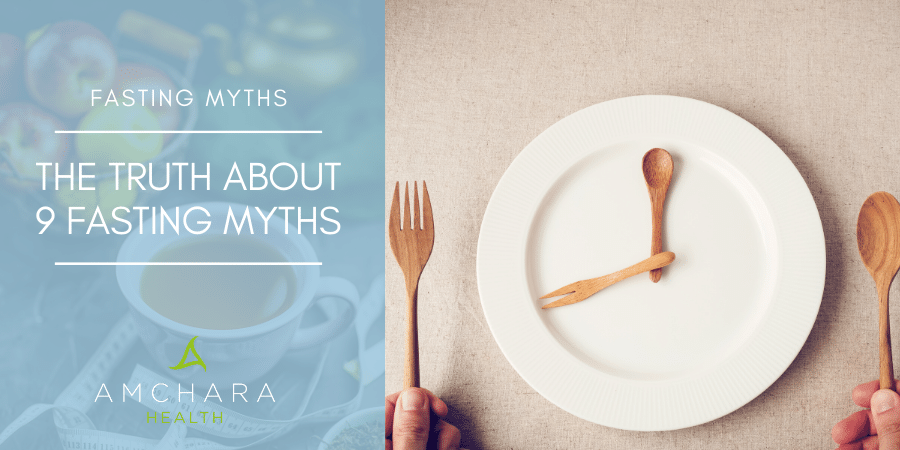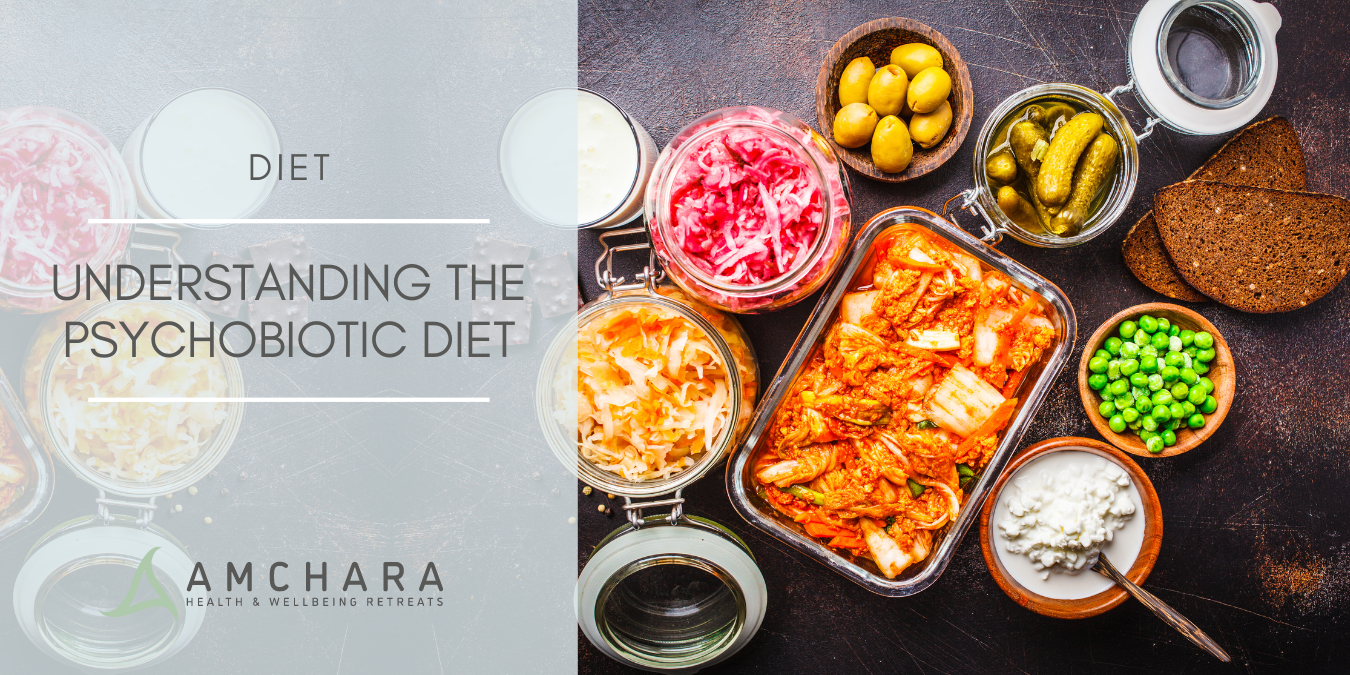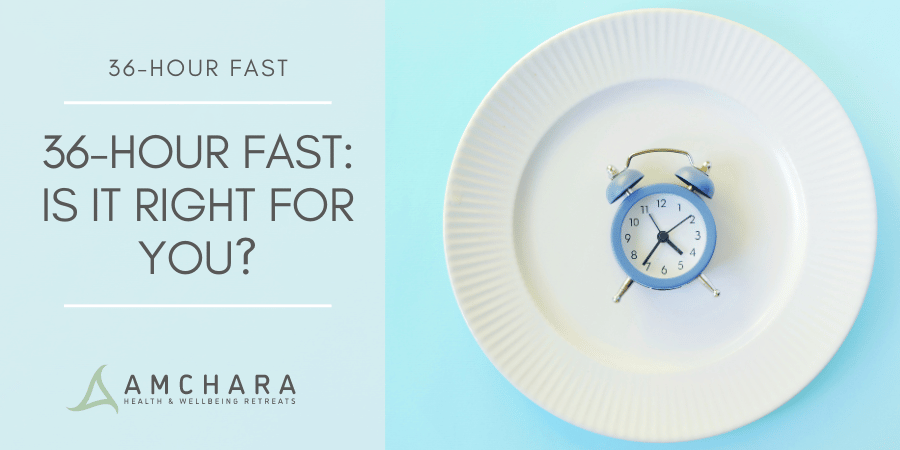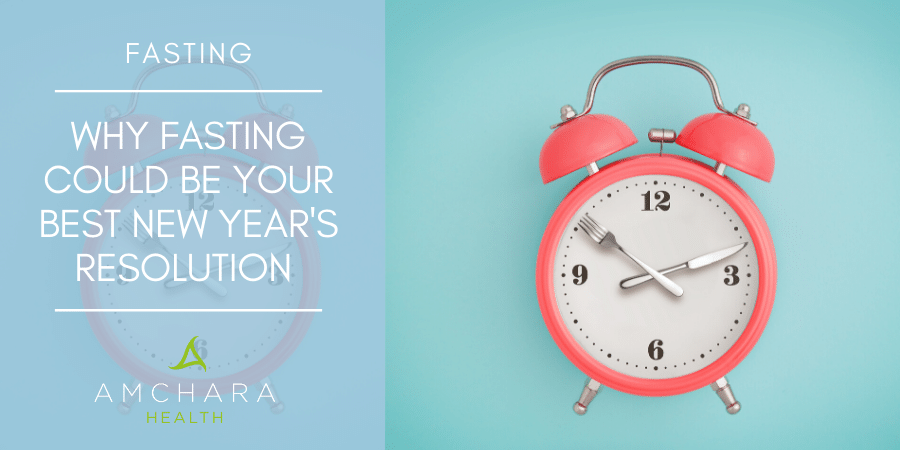Topics covered in this article:
- Myth#1. Fasting isn’t backed by science
- Myth#2. Fasting is just another ‘fad’ diet
- Myth#3. Fasting will make you go into ‘starvation mode’
- Myth#4. Fasting leads to muscle loss
- Myth#5. Fasting will disrupt your blood sugar
- Myth#6. Fasting allows you to eat whatever you want
- Myth#7. Fasting will make you eat more at mealtimes
- Myth#8. Fasting will disrupt your sleep
- Myth#9. Fasting is suitable for everyone
In recent years there has been an explosion in information on food, nutrition and health, and an increased interest in fasting. Despite the plethora of information available, fasting is often misunderstood and it seems there are several common ‘myths’ surrounding fasting.
We’re dedicated to providing you with both insightful information and evidence-based content and in this article, we take a look at 9 fasting myths and reveal the truth.
Myth#1. Fasting isn’t backed by science
This myth is easy to dispel – a simple search on Google Scholar using the word fasting brings up an extraordinary number of results dating back to the 1970s. Refine that search to papers published from 2016 onwards and there are still over 100,000 results to sift through. The recent media interest in fasting may be fed by emerging research into various aspects of fasting, and it seems new research is published on an almost weekly basis.
Scientists such as Professor Valter Longo, Director of the Longevity Institute at the University of Southern California, and Dr Satchidananda Panda, from the Salk Institute for Biological Studies, have spent their entire careers researching fasting in one way or another. To say that fasting isn’t backed by science is simply untrue.
Myth#2. Fasting is just another ‘fad’ diet
Fasting is not a new concept and goes back to hunter-gatherer times when a whole day or more was spent searching for the next meal. In the 21st century, food is aplenty and eating habits have changed. There has been an increase not only in the amount of food eaten but the type and timings. Eating past sunset is more common and many people eat 3 meals a day plus 2-3 snacks. Rates of obesity and chronic health conditions, like Type 2 diabetes, are rising and are at concerning levels.
In the battle to tackle obesity a vast number of weight loss diets have appeared, from the cabbage soup diet through to the master cleanse lemonade diet, and guided weight loss groups like Weight Watchers and Slimming World are becoming increasingly popular.
Fasting may be seen by some to be yet another weight loss ‘fad’, but research indicates the benefits extend beyond weight loss.
There are a variety of different types of fasting and this is where it can become confusing. A true fast may be defined as 24 hours or more without consuming food, and drinking only water.
Intermittent fasting is a term covering many patterns of eating including calorie restricted ‘fasting days’, where food intake is restricted for 2 days and normal calorie consumption occurs on the other 5 days a week, as in the 5:2 diet.
There is also the fasting mimicking diet that dictates a set percentage of carbohydrate, fat and protein intake over a period of three to six months.
Another type of fasting, called time restricted eating (TRE), advocates eating in line with the body’s natural circadian rhythm and restricts food intake to an 8-10 hour window, such as the 16:8 plan.
Evidence shows many of these types of fasting bring not only a reduction in body weight, but also alter distribution of fat. Visceral fat, found in the abdominal region, is known to increase a variety of inflammatory and hormonal conditions and is linked to poor cardiovascular health. Fasting has been shown to increase visceral fat loss (1).
Due to several other physiological improvements, weight loss through fasting may not only be easier than traditional weight loss plans, but also more consistent and sustainable over the long term. All of which makes fasting an interesting approach to the global obesity epidemic.
Myth#3. Fasting will make you go into ‘starvation mode’
This is probably the biggest myth surrounding fasting – the notion that restricting food intake for a short period of time will alter metabolism and cause the body to go into ‘starvation mode’ is not backed by science.
It is commonly thought that after missing a few meals, the body will then store any energy taken in following the fasting period, due to a perceived famine. The human body is very clever and has several natural adaptations to changing patterns of food intake. Energy reserves are stored in your liver and muscles, in the form of glycogen, and fat itself serves as a site for additional energy.
In times when food intake is restricted, glycogen is the first store of energy to be used – this can typically take around 12 hours. After glycogen stores are depleted, your body ‘flips the switch’ to burn fat stores.
Research indicates that metabolism actually goes up during a fast – one study showed a 14% increase in resting energy expenditure by day 3 of a water fast.
Myth#4. Fasting leads to muscle loss
This myth may be linked to the starvation myth. The thought that once food intake is restricted the body will use up all tissues, in order to preserve functioning, is rather simplistic.
Once glycogen stores have been used up and fat is used to produce ketones, another energy ‘currency’, there can be a significant reduction in fat mass over time. Muscle tissue is essential for movement, and in evolutionary terms it makes no sense to break this tissue down in a short term absence of food. Going back to hunter-gatherer times, where there were natural gaps between meals, such a breakdown would mean there would be increasingly diminished capacity to hunt for the next meal.
Extreme famine in third world countries leads to the breakdown of muscle in order to sustain energy and life. But this is a result of severe and prolonged famine and malnourishment, not a lapse in food intake of 12-36 hours.
Maintaining muscle mass whilst fasting can be enhanced by ensuring a balanced nutritional intake during the non-fasting period, and including high quality protein sources such as eggs, fish, chicken, beans, lentils, nuts and seeds. Including regular sessions of resistance training, with the use of body resistance, hand held weights or resistance machines, ensures muscles are worked and stimulated, promoting muscle building.
Myth#5. Fasting will disrupt your blood sugar
Quite the opposite is true here. Numerous studies show that during adaptation to a lack of food, blood sugar levels remain stable, due to switching to using stored fuels, and in the long term several positive changes lead to a long term stabilisation of blood sugar levels.
Insulin is a hormone responsible for moving glucose out of blood and into cells, to be used as energy or stored for later. Dysregulation of insulin, such as in Type 2 diabetes, has also been linked to many other health issues, including metabolic syndrome and inflammation.
Fasting has been shown to regulate insulin levels and improve body cells’ response to insulin, thereby reducing insulin resistance (3). This effect can be seen independent of weight loss. It is thought that increasing body cells’ sensitivity to insulin may be related to an increase in a protein called adiponectin. Low levels of adiponectin are seen in insulin resistance and fasting is now known to improve adiponectin levels (4).
Fasting seems to have a long term beneficial impact upon blood sugar and insulin sensitivity and some evidence indicates fasting may reduce the risk of Type 2 diabetes (5).
Myth#6. Fasting allows you to eat whatever you want
Eating high calorie foods, rich in saturated fats, salt and sugar all have negative effects on the body, both in the short term and long term. The nutritional profile of fast food, takeaways or processed foods cannot be compared to wholesome natural foods. It is well known that maintaining a low intake of salt, sugar and saturated fats reduces the risk of developing poor cardiovascular health, inflammation, Type 2 diabetes and many other conditions.
The evidence on fasting is showing that as well as playing a role in balancing blood sugar, it can also improve blood fats such as cholesterol and triglycerides (6). However, it isn’t wise to think you can get away with making poor food choices because fasting will ‘reverse’ the negatives.
Fasting should accompany a varied diet rich in whole grains, oily fish, and other quality proteins, and should also include nuts, seeds, legumes and a large selection of fruits and vegetables daily.
Myth#7. Fasting will make you eat more at mealtimes
Restricting food intake may raise concerns you will crave certain foods or ‘binge eat’ when fasting is over. In fact, this doesn’t seem to be a common problem and many methods of fasting have repeatedly shown to exert positive influences on appetite regulation.
Appetite regulation is under the control of several hormones. Leptin is responsible for signalling a sense of satiety, whilst ghrelin has the opposite job and stimulates appetite, hence it is often known as the ‘hunger hormone’ (7).
Fasting seems to regulate appetite by improving body cells’ response to leptin, enhancing that ‘full’ feeling. Research indicates that appetite in the evening can be reduced with regular fasting (8).
Of course, there may be psychological factors contributing to overeating following fasting, and it is important to enter into fasting without thoughts or feelings of being deprived of food. Mindfulness and mindful eating can help with ensuring a positive relationship with food and help prevent overeating.
Myth#8. Fasting will disrupt your sleep
Whilst this myth may have some truth in the short term, the long term effects of fasting on sleep should also be taken into account.
Fasting stimulates a cascade of hormones, designed to keep energy levels up. This includes the release of adrenal hormones like cortisol and adrenaline. The impact of these hormones on sleep is well known and they have been linked to a degree of sleep disruption. Add to this the impact of hunger, if a 24 hour water fast is being undertaken, then it may seem reasonable to assume sleep will be disrupted when fasting.
Studies into sleep quality and pattern whilst fasting during the period of Ramadan show potential disruptions to normal sleep patterns. Ramadan fasting involves restricting food during daylight hours and traditionally meals can be taken between sundown and bedtime. This is often a pattern of eating that goes against natural insulin secretion and sensitivity and provides food when the body is least able to deal with it. Many of the studies around Ramadan and sleep conclude that certain lifestyle choices may also be playing a role – not just fasting.
One area of research, showing benefits of fasting on sleep regulation, comes from many decades of studies performed by Dr Satchidananda Panda. Dr Panda has spent the best part of two decades looking at influences to the circadian rhythm. One of the major influences is of course natural daylight exposure, but Dr Panda’s research has also shown that timings of meals can play a role – when you eat can strengthen or weaken the circadian ‘clock’.
A robust and synchronised circadian rhythm is vital for good sleep patterns. Early time restricted eating, involving consuming food in the earlier part of the day and fasting for around 14-16 hours each day, is known to positively contribute to overall circadian training (9).
Enhancing sleep during fasting can be achieved by good exposure to natural daylight before midday, being active, eating high quality foods in the non-fasting period, and taking part in activities that stimulate the relaxing parasympathetic nervous system in the run up to bedtime, such as yoga, meditation, a hot bath, massage or breathing exercises.
Myth#9. Fasting is suitable for everyone
Each and every person is an individual with a unique genetic make-up and an equally unique set of personal circumstances, so it makes sense that not all people will respond to fasting in the same way. Although a wealth of evidence promotes the physical and psychological benefits of fasting, it may not be suitable for everyone.
Fasting is not recommended for children, pregnant and breastfeeding women, the elderly or those recovering from trauma or surgery. Conditions such as eating disorders, hypertension, cancer, gout, kidney problems and heart conditions may also mean that fasting is not suitable.
It is advisable to consult a medical professional before fasting if you suffer with any long term health conditions or take certain medications.
Takeaway
Evidence is constantly emerging on the health benefits of fasting, and with the abundance of information it can be tricky to sift through and separate fact from fiction. Understanding how fasting works, the impact on the body and working out which type of fasting is most suitable in your circumstances is important for achieving the best results to optimise your health.
If you would like to know more about fasting, or undertake a guided fast, a 1-2-1 consultation with an experienced Amchara Personalised Health practitioner can help you begin your fasting journey. A Personalised Health practitioner will take your full health history and using functional medicine principles, and state of the art tests, devise a unique programme tailored to your health goals.
This doesn’t need to be the end of the article!
With your comments we’d love to continue the conversation.
Do you fast? How did you get started?
What are your experiences?
Sharing knowledge and experiences empowers others to take control of their health – we would love to hear from you.
Please leave your comments below.
Read this next:




